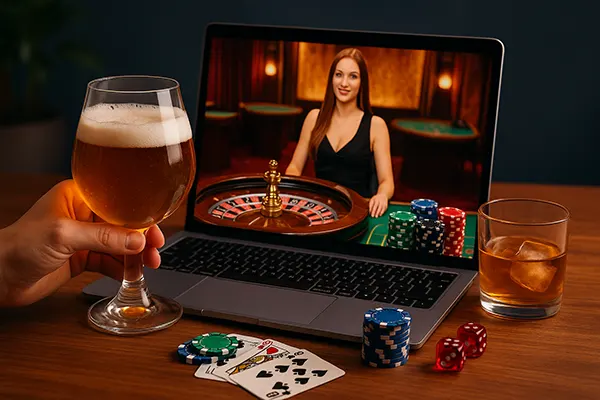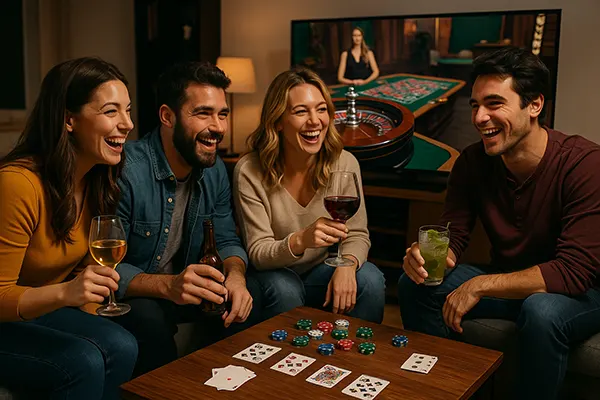
Alcohol in Live Online Casinos: The New Social Dynamic of Home Gaming
The introduction of alcohol into live online casinos has become a subject of debate in recent years. With the increasing popularity of streaming-based gambling and the growing realism of live dealer experiences, alcohol adds another layer of social interaction that resembles physical casinos. By 2025, this trend has developed into a unique aspect of remote gambling, shaping how players interact with each other, the game, and the atmosphere of play.
Changing Habits of Home-Based Gambling
One of the most significant shifts in the live casino market is the blending of traditional social rituals with digital gaming. Alcohol consumption has always been associated with brick-and-mortar casinos, where complimentary drinks are part of the experience. Now, players recreate this ritual at home, adding to the authenticity of their gaming sessions.
Research conducted in 2024 indicated that nearly 35% of regular live casino players admitted to consuming alcohol while participating in streamed games. This reflects a behavioural shift where the home environment is being adapted to mimic the physical casino ambience. Instead of being a solitary digital activity, gambling is becoming more immersive and socially engaging.
However, experts also point out potential risks. Unlike land-based casinos, there are fewer controls in place to monitor excessive alcohol consumption during online play. This raises questions about responsible gambling measures that operators must address moving forward.
The Role of Operators in Moderating Experiences
Casino operators have started to recognise this trend and adapt their offerings accordingly. Some now design marketing campaigns that emphasise the “night out at home” experience, where alcohol, social chat functions, and live hosts create a dynamic similar to visiting a physical venue.
Yet, there is an ongoing ethical discussion. Promoting alcohol alongside gambling could be considered problematic, especially in jurisdictions where advertising regulations are strict. Operators must carefully balance player engagement with responsible messaging to avoid encouraging unsafe behaviours.
By 2025, some regulators have begun to issue clearer guidelines on responsible play when alcohol is involved. These include mandatory pop-up reminders, enforced breaks, and stronger self-exclusion tools that take alcohol consumption into account as part of risk management.
Psychological and Social Implications
The addition of alcohol into live casino play influences not only individual decision-making but also collective player dynamics. Studies suggest that alcohol consumption lowers inhibitions, leading to more impulsive betting patterns. This can increase risk-taking behaviour, which, while attractive for some players, also heightens the potential for financial losses.
On the social side, alcohol often enhances communication within live chat functions. Players may feel more relaxed, interact more openly with dealers and fellow participants, and create a sense of community that strengthens the appeal of live casino games. This has given rise to the idea of online casinos as “digital pubs” where gaming and social drinking overlap.
Nonetheless, this social dimension is not without its drawbacks. Toxic interactions, inappropriate behaviour, or harassment can emerge more frequently under the influence of alcohol, requiring moderators and stricter conduct policies within chat environments.
Balancing Entertainment with Responsibility
Psychologists and gambling experts agree that alcohol should never be ignored as a factor influencing player behaviour. While it can enhance entertainment, it must be viewed through the lens of potential harm. Responsible gambling frameworks now include alcohol awareness as part of their educational campaigns.
Operators that introduce responsible drinking messages during live streams are seen as more credible and trustworthy. For example, reminders to “play and drink responsibly” are being integrated into broadcast overlays, reinforcing safe practices without diminishing the entertainment aspect.
In the long term, the success of live online casinos may depend on finding the right balance between offering an authentic experience and safeguarding players from the risks associated with combining alcohol and gambling.

Future Trends in Live Casino Culture
Looking ahead, the social dynamics of live online casinos are expected to evolve further. With the rise of virtual reality casinos and more interactive live streaming platforms, the role of alcohol as a cultural element may become even more pronounced. Virtual “casino nights” hosted from home could combine drinks, friends, and digital gaming into one seamless event.
Technology also opens the door to innovative safety features. Wearable devices and smart integrations may allow casinos to detect signs of intoxication, such as delayed reaction times or erratic betting behaviour, and trigger automated interventions. While still in development, such tools reflect the industry’s awareness of alcohol-related risks.
Meanwhile, regulators continue to monitor the connection between alcohol, gambling, and player well-being. Countries such as the UK, Denmark, and Sweden are already reviewing stricter frameworks in 2025 to ensure that the integration of social drinking into online play does not undermine public health goals.
The Evolution of Responsible Gaming Standards
The future of alcohol in live online casinos lies in responsible innovation. Industry leaders stress that while creating realistic, engaging environments is crucial, it must not come at the expense of safety. Transparency, education, and player support are central pillars of sustainable growth in this sector.
Collaborations between gambling operators, health organisations, and regulators are becoming more common. These partnerships aim to share research data, set responsible guidelines, and ensure that alcohol’s role in online gaming is understood and properly managed.
Ultimately, the social dynamic of alcohol in live online casinos reflects broader cultural changes: the blending of leisure, technology, and lifestyle. By addressing both its positive and negative aspects, the industry can continue to evolve responsibly, ensuring that home gaming remains enjoyable, safe, and socially meaningful.
